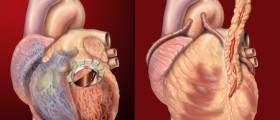
Lightheaded and sick - what's the trick?
Dizziness refers to the loss of orientation and steadiness, and the person experiencing the aforementioned conditions feels a sort of motion in the head, resembling the sensations of swimming or shakiness. The sufferers sometimes report that they feel as if they are about to fall down or lose balance.
Three main categories of dizziness exist: vertigo, disequilibrium and faintness. Sick people claim that they feel as if they are losing strength and that they are about to become unconscious, and improper blood circulation is found to be the key source of the problem. The malfunctioning of the circulatory system typically originates from conditions such as heart problems, dehydration and severe loss of blood.
From the patient's point of view, disequilibrium seems to lead to falling to one side. Light-headedness and disequilibrium are most commonly caused by low blood glucose level, bacterial and viral irritations, as well as low oxygen levels in blood. On the other hand, vertigo is a state of hallucination when the patient feels continuous whirling and spinning.
In treatment of the condition, it is very important to pinpoint the very root of the dizziness. If a condition such as heart problem or anemia is the culprit underlying the problem of dizziness, it is only logical that curing the condition will automatically lead to an improvement.
Nausea is not itself an illness, but it is really an indicator of some other issue in a patient's body, and it is usually linked to stomach or digestive tract. Dehydration and loss of appetite usually go hand in hand with nausea, so it's of utmost importance that the patient be carefully rehydrated. When treating the nausea, doctors usually combine treatments for underlying causes and treatments for immediate symptoms.
What's behind nausea and dizziness?
There are several different causes of the aforementioned conditions. Some of them include heart conditions, kidney conditions, anemia, anxiety, and they can all induce dizziness and nausea. In itself vertigo is not an illness, but it can be an indicator of some other more serious underlying issue.
Migraine, inflamed ear and acoustic neuroma are among the most prominent culprits behind the dizziness and nausea. To this list we can also add stress, feeling of depression, irritable bowel syndrome, and different kidney problems et cetera.
It is of key importance that you determine what is the underlying problem behind your nausea or vertigo. Thanks to the today's advanced pharmaceutical industry, you can get all sorts of medications for relieving of the immediate symptoms, but be careful not to mask the signals of a more serious condition lying in wait.

















Your thoughts on this
Loading...